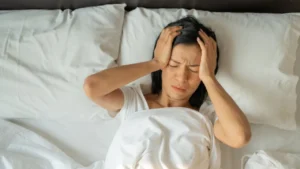Insomnia
 The difficulty to fall or stay asleep at night, which results in unrefreshing or non-restorative sleep, is known as insomnia. It’s also a very prevalent issue that negatively affects your energy levels, mood, and capacity for functioning during the day. Insomnia that persists over time may even exacerbate significant health issues. No matter how exhausted they are, some people have trouble falling asleep. Some people awaken in the middle of the night and spend hours lying awake, tensely observing the time. But because everyone has a different bedtime, if you feel sleepy and worn out during the day, you can have insomnia. Even though it is the most frequent sleep complaint, insomnia is not the only sleep condition. It’s more accurate to consider it a symptom of another issue, whether it be as easy as consuming too much caffeine during the day or as complicated as feeling stressed out.
The difficulty to fall or stay asleep at night, which results in unrefreshing or non-restorative sleep, is known as insomnia. It’s also a very prevalent issue that negatively affects your energy levels, mood, and capacity for functioning during the day. Insomnia that persists over time may even exacerbate significant health issues. No matter how exhausted they are, some people have trouble falling asleep. Some people awaken in the middle of the night and spend hours lying awake, tensely observing the time. But because everyone has a different bedtime, if you feel sleepy and worn out during the day, you can have insomnia. Even though it is the most frequent sleep complaint, insomnia is not the only sleep condition. It’s more accurate to consider it a symptom of another issue, whether it be as easy as consuming too much caffeine during the day or as complicated as feeling stressed out.
Primary causes of insomnia include
- Stress resulting from major life events, such as a job loss or change, the death of a loved one, a divorce, or a move
- A change in your sleep routine, such as jet lag, a new shift at work, or undesirable habits you acquired when you previously experienced sleep issues.
- Your genes according to research, insomnia may run in families.
Secondary causes of insomnia include:
- Medications for colds, allergies, depression, high blood pressure, and asthma.
- Mental health conditions include anxiety and depression.
- Use of caffeine, tobacco, or alcohol, as well as illegal narcotics
- Pain or discomfort at night.
- Hyperthyroidism as well as additional endocrine issues
- Additional sleep problems, such as sleep apnea or restless legs syndrome
- PMS and menopause
- Alzheimer’s illness and various forms of dementia
- ADHD
- pregnancy
Symptoms
The symptoms of insomnia include various sleep difficulties and daytime problems. Common sleep issues that can signal the presence of insomnia include:
- Trouble falling asleep
- Trouble staying asleep throughout the night
- Unwanted early morning waking
- Resisting sleeping at bedtime in children and teens
- Difficulty sleeping without a caregiver’s help in children and teens.
In addition, insomnia causes daytime symptoms related to the sleep loss:
- Fatigue
- Impaired attention or memory
- Trouble with work, school, or social performance
- Irritability or disturbed mood
- Sleepiness
- Decreased motivation
- Increased accidents or mistakes
- Worries about or discontent with one’s sleep
- Behavioral issues, like hyperactivity or aggressiveness, especially in children
Prevention
Good sleep habits, also called sleep hygiene, can help you beat insomnia. Here are some tips:
- Go to sleep at the same time each night, and get up at the same time each morning. Try not to take naps during the day, because they may make you less sleepy at night.
- Don’t use phones or e-books before bed. Their light can make it harder to fall asleep.
- Avoid caffeine, nicotine, and alcohol late in the day. Caffeine and nicotine are stimulants and can keep you from falling asleep. Alcohol can make you wake up in the middle of the night and hurt your sleep quality.
- Get regular exercise. Try not to work out close to bedtime, because it may make it hard to fall asleep. Experts suggest exercising at least 3 to 4 hours before bed.
- Don’t eat a heavy meal late in the day. But a light snack before bedtime may help you sleep.
- Make your bedroom comfortable: dark, quiet, and not too warm or too cold. If light is a problem, use a sleeping mask. To cover up sounds, try earplugs, a fan, or a white noise machine.
- Follow a routine to relax before bed. Read a book, listen to music, or take a bath.
- Don’t use your bed for anything other than sleep and sex.
- If you can’t fall asleep and aren’t drowsy, get up and do something calming, like reading until you feel sleepy.
- If you tend to lie awake and worry about things, make a to-do list before you go to bed. This may help you put your concerns aside for the night.
